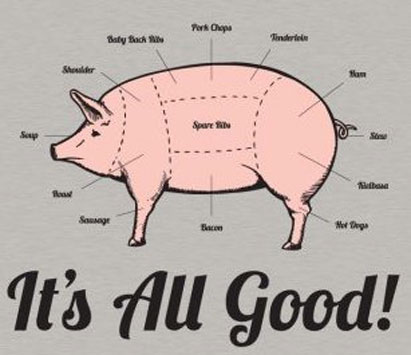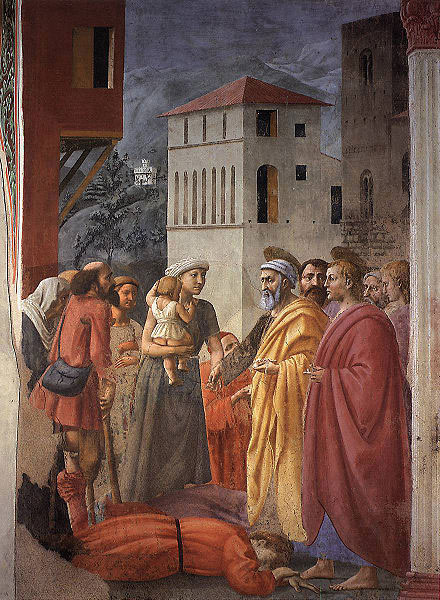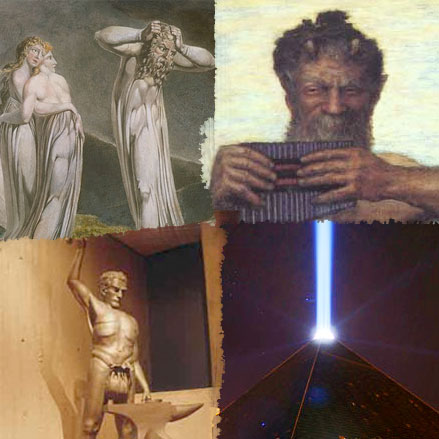Mar
31
2011

or The Disunited State of Samaria
“…and they are seven kings;
five have fallen,
one is,
the other has not yet come;
and when he comes,
he must remain a little while.” (Revelation 17:10)
Time for another weird one. Although it’s probably only weird to the conservative evangelical Bible scholars among us. [1]
Albert’s post on marriage the other day allows us to see the context of the sin of the Samaritan woman. James Jordan observes that this woman was most likely a victim of this unjust system, hence the other Samaritans’ readiness to believe her testimony.
Continue reading
4 comments | tags: John, John Barach, Ralph Smith, Revelation, Typology, Warren Gage | posted in Biblical Theology, Quotes
Mar
16
2011
or Reading Between the Lines

Many, or most, evangelicals, assume that God is into spoonfeeding us. They think that if a biblical type is not explicitly referred to in the text, then it is risky business. Many evangelicals are brilliant thinkers, but most are not lateral thinkers when it comes to literature. Or at least, they are too cautious to think laterally when analysing the Bible, and only read “the letter of the law.” They, and their congregations, miss out on 50% of the Scriptures — all the parts written between the lines. The funniest part is that this is exactly the element that makes many children’s books, and the most delicious adult dramas, so entertaining. What a bunch of bores. They are like the naive Australians in a Noel Coward play who took every word of the sophisticated Brits at face value. The Bible is far more sophisticated than any other book on your shelf. It is indeed a crafty beast.
Continue reading
13 comments | tags: Genesis, Hermeneutics, James Jordan, Luke, Satan, Typology | posted in Biblical Theology
Dec
28
2010

“Who may ascend into the hill of the LORD?
Or who may stand in His holy place?
He who has clean hands and a pure heart…” (Psalm 24:3-4)
In Leviticus, an Israelite is to lay his hand on the sacrifice that covers his sin and allows him to draw near to God. It was the red hand of death and the whiteness of a pure sacrifice willing to take the “stroke” (plague).
“And Abraham stretched out his hand and took the knife to slay his son.”
Genesis 22:10
But the Lord Himself covered Moses with His hand as the consuming fire of His glory passed-over the mountain. It was the hand of life and the whiteness of imparted glory. As far as was possible, Moses saw the Lord as He was, because he was like Him.
Continue reading
Comments Off | tags: Abraham, Genesis, Leviticus, Moses, Passover, Revelation, Typology | posted in Biblical Theology, Totus Christus
Dec
14
2010
or God is a Foodie

The Mosaic dietary laws were temporary. Just as a Nazirite made a temporary vow for the purpose of sanctification for holy war, so Israel’s purpose as a nation of holy warriors included certain abstinences prescribed by God. Once the war was over, the prohibitions were removed. “Bridal food” (the Feast of Tabernacles) was back on the menu in the first century.
The Nazirite vow was a symbolic form of death and resurrection, of the bridegroom going into the grave (short hair), slaying the serpents, and emerging from the chamber with His bride (long hair), whom He then presented to the Father. [1] The prohibition on the Tree of Knowledge was a temporary one. It began Adam’s holy war, but he broke the vow, failed to rescue the bride and was expelled from the Lord’s table. [2]
Continue reading
11 comments | tags: Communion, Fasting, Food laws, Genesis, Jacob, James Jordan, Leviticus, Nazirite, Robert Farrar Capon, Typology | posted in Biblical Theology, Christian Life, Quotes
Aug
11
2010
The Art of Interpretation

Oh, the depth of the riches and wisdom and knowledge of God! How unsearchable are his judgments and how inscrutable his ways! (Romans 11:33)
Hermeneutics is a big word you learn at Bible College. It is the study or practice of interpreting texts in the areas of literature, law and religion.
In literature, discovering the intent of an author can be an enlightening game. In law, one’s life (or life sentence) can hang in the balance of a judge’s interpretation. In religion, besides plumbing the depths of the mind of God, it is an enlightening game in the balance of which many lives hang. God has revealed His mind in His Word, and has also seen fit to give to His people the often difficult job of interpreting it.
[This post has been refined and included in Sweet Counsel: Essays to Brighten the Eyes.]
Continue reading
Comments Off | tags: Ezekiel, Hermeneutics, John, Literary Structure, Revelation, Timothy, Typology, Warren Gage | posted in Biblical Theology
Jul
17
2010

But each one is tempted when he is drawn away by his own desires and enticed. Then, when desire has conceived, it gives birth to sin; and sin, when it is full-grown, brings forth death. (James 1:14-15)
The structure of God’s work in the world finds its origin in His trinity: Word, Sacrament, Government (Discipline). Often in the prophets, the man of God is given a sign which is a type of a greater event to come. The prophet is the sacrament that mediates the Word of discipline to the People.
Continue reading
Comments Off | tags: Abraham, Acts, Atonement, Balaam, Communion, Genesis, Isaiah, Jezebel, Judas, Moses, Replacement Theology, Totus Christus, Typology | posted in Biblical Theology, The Last Days
Jul
10
2010

Foul-mouthed sometime comedienne Janeane Garofalo recently commented that the Bible was a “work of fiction” for a “child-like audience.” The problem with moderns, including most modern evangelical Christians, is that they think the Bible is primitive. Hah! They’re like a man from the industrial revolution classifying a printed circuit board as a pretty (if eccentric) Mayan artifact. Providentially, the Bible is easier to understand than a circuit board.[1] It was designed for discipleship, so we need to be taught how to read it.
Continue reading
Comments Off | tags: Systematic typology, Typology | posted in Apologetics, Bible Matrix, Biblical Theology
May
28
2010

Very often, the full significance of certain events and people early in Genesis is not apparent until we observe the same patterns of sin and redemption as they appear in greater detail later in Biblical history. (Well, that’s my story and I’m sticking to it. You be the judge.)
Continue reading
Comments Off | tags: Genesis, Typology | posted in Biblical Theology
Mar
20
2010

or Animal, Vegetable, Mineral
There’s some weird stuff in Leviticus. It is deliberately so, forcing us to chew on it, which in turn forces us to see the world in terms of symbols, as God intended. Most of us moderns can’t be bothered with it. It’s beyond our capacity. We think such notions are childish when in fact they require an uncommon wisdom.
Continue reading
4 comments | tags: High Priest, James Jordan, Leviticus, Tabernacle, Typology | posted in Biblical Theology, Quotes
Jan
26
2010
or James Jordan’s Big Hammer
 “My God, it’s full of stars!”
“My God, it’s full of stars!”
One of the reasons I appreciate James Jordan is his ability to identify the “universals” in Scripture. Understanding these recurring themes answers many questions and solves many mysteries. These universal “roles” and events all point forward to the events of the first century. For instance, we cannot understand what the apostles meant by the phrase “the sons of God” without checking its history in the Old Testament. [1]
The danger with dealing in all the “big picture” stuff is that it can become self-serving. The heart is deceitfully wicked, and theology can become a kind of escapism, an ideology. Like the worst of the 20th century’s political ideologies, it can be divorced from reality so that in practice it rides roughshod over people to achieve its goals. Any big theology must maintain a big pastoral heart.
[This post has been refined and included in Sweet Counsel: Essays to Brighten the Eyes.]
Continue reading
2 comments | tags: Doug Wilson, James Jordan, Literary Structure, Postmillennialism, Typology | posted in Biblical Theology, Christian Life



































